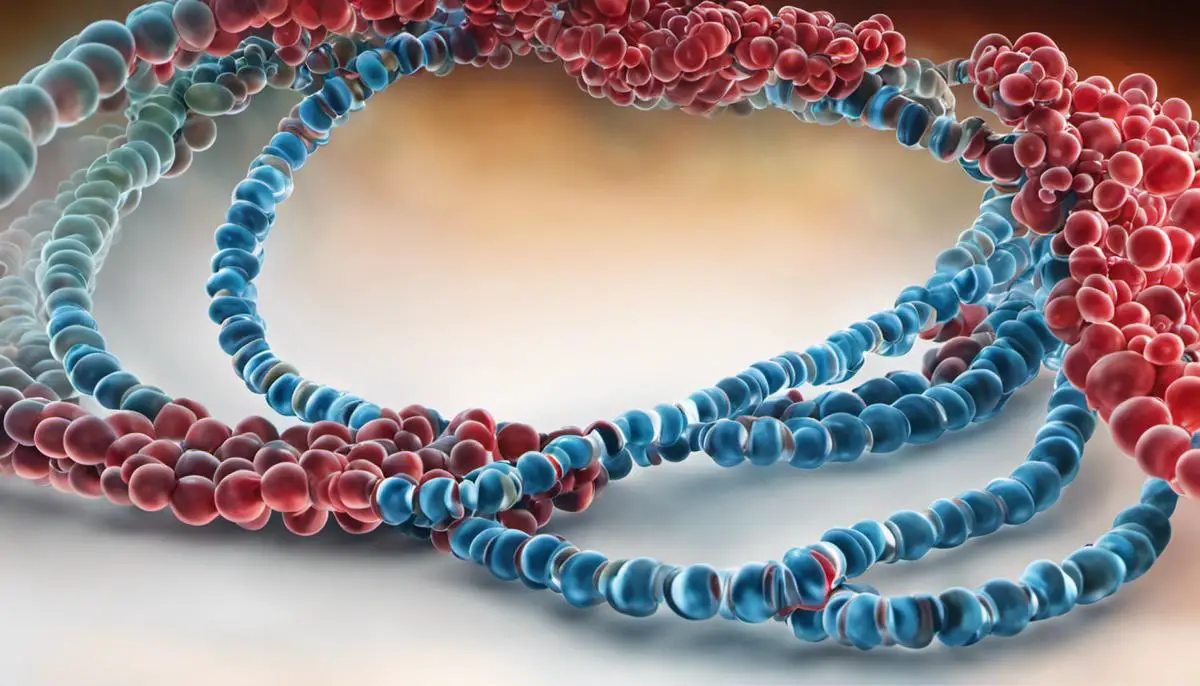Colon cancer, a prevalent medical concern, is a result of an intricate interplay of various factors. Comprehending these determinants can not only aid in the management of the disease, but also in its prevention. The causative factors can range from genetic predispositions to lifestyle choices and environmental elements. A person’s genes can often dictate their susceptibility to diseases, including colon cancer. Conditions such as Lynch syndrome or familial adenomatous polyposis can significantly increase the risk of the development of the disease. However, it is not solely one’s genetic makeup that defines their likelihood to be diagnosed with colon cancer. Lifestyle practices including diet and physical activity carry a notable impact. Lastly, external factors such as the environment one resides in can also contribute to this complex equation. Prolonged exposure to harmful elements like asbestos or radiation have been associated with an escalated risk of colon cancer.
Genetic Factors of Colon Cancer
Understanding the Genetic Impact on Colon Cancer
The genesis of colon cancer is deeply rooted in our genetic makeup. However, carrying these genes does not guarantee the development of the disease, but it highly escalates the risk.
One commonly occurring genetic condition linked with colon cancer is Hereditary Nonpolyposis Colorectal Cancer (HNPCC), also known as Lynch syndrome, which results from mutations in certain mismatch repair genes. These genes are essential to rectifying errors during DNA replication in cell division. Malfunctions in these genes can lead to unrepaired DNA errors, causing cancerous mutations. Lynch syndrome carriers face a 70% probability of developing colon cancer during their lifetime.
Similarly, Familial Adenomatous Polyposis (FAP), another pivotal genetic condition, leads to the formation of multiple polyps in the colon and rectum’s lining. Polyps, being abnormal growths, can potentially evolve into cancer. FAP results from mutations in the APC gene, crucial for regulating cell growth. If left unchecked, FAP invariably results in colon cancer by the age of 40.
With the advancement in DNA sequencing technologies, several genes like MLH1, MSH2, MSH6, PMS2, and EPCAM have been associated with a heightened risk of colon cancer. Mutations in these genes disrupt DNA repair processes, consequently causing DNA damage, uncontrolled cell growth, and potentially colon cancer.
Besides these inherited factors, having a first-degree relative with colon cancer can also increase your risk. This increment in risk may be due to genetics, common lifestyle habits, or both. The risk accentuates if the relative got diagnosed at a young age or if more than one first-degree relative is involved.
Even considering these genetic predispositions, most colon cancer cases occur in individuals without any known genetic risk factors, emphasizing the major impact of aging and lifestyle habits, such as diet, smoking, and lack of physical activity.
Although inherited conditions significantly contribute to colon cancer risk, they are relatively rare in the populace. Nonetheless, being aware of one’s genetic predisposition can enable preventative measures, such as regular check-ups, colonoscopies, and informed lifestyle changes. An open dialogue about family health history with healthcare providers can empower individuals to take steps for risk reduction.

Lifestyle Influences on Colon Cancer
The Role of Lifestyle Habits in Fostering Colon Cancer Risk
Our lifestyle choices, encompassing diet, physical activities, and much more, significantly influence the risk of colon cancer development. Thus, acknowledging these factors and adopting preventive measures can potentially reduce the risk of this disease.
One of the significant risk factors associated with colon cancer is unhealthy nutritional habits.
A diet high in red and processed meats has been linked to an increase in colon cancer risk. Consuming large amounts of red meat, such as beef and pork, and processed foods like hot dogs and cold cuts, can elevate the risk of colon cancer.
Smoking and alcohol consumption have also been identified as major risk factors for colon cancer.
- Long-term smoking increases the likelihood of colon cancer,
- while heavy or regular alcohol consumption can also have similar effects.
Obesity as a Risk Factor for Colon Cancer
Individuals who are overweight or obese have a higher risk of developing colon cancer than those having a healthy weight. Obesity often comes along with other factors that can also increase one’s risk, such as a physically inactive lifestyle and poor diet.
Physical inactivity or a sedentary lifestyle is another significant contributor to the onset of colon cancer.
Individuals who lead a sedentary lifestyle, marked by long periods of sitting or laying down and minimal physical activity, are at a higher risk of colon cancer compared to those who maintain regular physical activities.
Preventive Measures Against Colon Cancer
In addition to recognizing the risk factors, it’s equally important to be aware of practices that can mitigate the risk of colon cancer.
Adhering to a healthy diet with lots of fruits, vegetables, and whole grains can reduce the risk of colon cancer.
This is because these foods are high in fiber, which aids in the regularity of your bowel movements, reducing the time that waste stays in your body.
Maintaining a proper weight and incorporating regular physical activity into your lifestyle can also serve to lower the risk.
Regular exercise not only diminishes the risk of obesity but it also promotes a healthy digestive system.
Limiting alcohol consumption and quitting smoking are also crucial actions in reducing colon cancer risk.
Apart from this, undergoing regular screenings and colon cancer tests can help in early detection and successful treatment of this disease.
In Summary: Lowering Your Risk of Colon Cancer
Our risk of developing colon cancer can depend on a multitude of factors, some of which are beyond our control, such as genetics. However, there are lifestyle changes and healthier choices we can make, which can greatly reduce this risk. Health professionals can provide personalized advice to further help you lower your risk through regular check-ups and healthcare consultations.

Environmental Factors and Colon Cancer
Understanding the Environmental Risk Factors for Colon Cancer
Several environmental factors can potentially increase the risk for colon cancer. Prolonged exposure to asbestos is one such risk. This heat-resistant, fibrous mineral can be unknowingly inhaled where it then embeds itself in the lung lining, causing inflammation and potentially leading to mesothelioma – a specific type of cancer. Recent studies suggest a similar risk may exist for colon cancer with asbestos exposure.
Radiation exposure, especially exposure to high levels of ionizing radiation, is another environmental risk. Individuals working in fields with frequent exposure to radiation, such as X-ray technicians or nuclear plant workers, have a heightened risk of developing colon cancer. That risk extends to survivors of radiation-related accidents or disasters.
Hazardous chemicals, especially if the body struggles to break them down and eliminate them, can contribute to the onset of colon cancer as well. Whilst some of these chemicals are inherent to certain occupational environments (such as benzene and vinyl chloride), others are present in previously processed or overcooked meats. These meats, if cooked at high temperatures, release carcinogens which may potentially harm our bodies.
Age, Ethnicity, and Racial Factors
Age is a significant risk factor in colon cancer, with the risk increasing markedly after age 50, and even more so after age 60. Interestingly, colorectal cancer tends to occur at a younger age in people of African descent compared to other racial groups, pointing to genetic susceptibilities.
Ethnicity is also seen to have an influence on colon cancer incidences. Those of Ashkenazi Jewish descent are found to have a higher risk of colon cancer because of a higher prevalence of mutations associated with this type of cancer.
Racial disparities in colon cancer occurrence and mortality are also observed. African Americans have the highest colon cancer rates of any racial group in the U.S. Some of these disparities can be attributed to differences in access to early screening and optimal treatments, dietary habits, and genetic differences. However, further understanding is needed in this area to address these disparities effectively.
Understanding these various factors provides a clearer picture of the risks and triggers associated with colon cancer, shedding light on prevention strategies and the need for early detection, especially for individuals at a higher risk.

Understanding the amalgamation of factors contributing to colon cancer can empower individuals to take proactive steps towards preventing or managing the disease. Incorporating healthier lifestyle choices, routine screenings particularly for those with a family history of colon cancer, and being conscious of one’s environment can remarkably influence the overall risk. While some factors like genetics and age are beyond our control, adopting a balanced diet, staying physically active, limiting the intake of alcohol and tobacco, and maintaining a healthy weight are decisive steps one can take. Furthermore, awareness and early detection through regular screenings can lead to successful treatment and a significant reduction in overall mortality rate related to colon cancer. Therefore, being informed about colon cancer – its causes, risk factors, and preventable measures – is a weapon one can wield in the battle against this common yet formidable disease.
